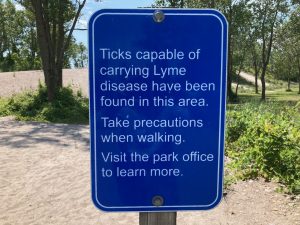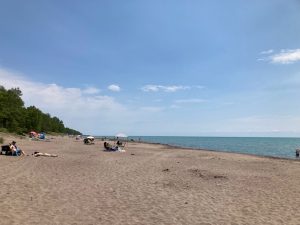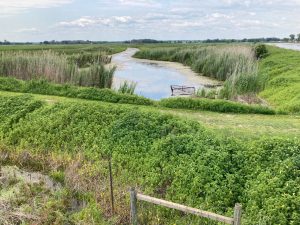From time to time, I read about rural history; recently, I’ve been reading about the Township of Wainfleet, Ontario
I like to read about rural history, the history of agriculture, and the history of the natural world.
In July 2021, I got to know a little about the history of Long Point, a community along Lake Erie, which I visited with some friends from my high school in the summer of 2021, as I’ve outlined at a previous post:
MCHS grads met for lunch on July 22, 2021, at Long Point Provincial Park on Lake Erie
This was the first time I had visited this park. An excerpt from the post reads:
The park on a sand spit extending into Lake Erie, was one that I had not know about until now. I’ve now been reading, online and in history books about Long Point, whose Indigenous history goes back to the last ice age.
I’ve found it remarkable that the colonial settler history of the area is strongly reminiscent of the history of Long Branch on the Lake Ontario shoreline in Toronto where I used to live. I’m thinking for example of the quick deforestation that occurred in both areas with resultant flooding.
As well, there are parallels in land use planning strategies (related to military defence in response to potential invasion by American forces) connected with settlement after the American Revolutionary War and in the context of the War of 1812. As I’ve mentioned elsewhere, Indigenous warriors played a key role on behalf of the British side during the latter war. After the conflict ended, however, the decisive Indigenous contribution to the military outcome was ignored in the ensuing peace treaty.
For their own respective reasons (related to nationalist public relations imperatives and historiographies), among the European settler societies in North America both the Canadian and American side has each claimed that it won the War of 1812 but there is some consensus among historians, from what I can gather, that the losing side in the War of 1812 was the First Nations side.
World Biosphere Reserve
Established in 1921, the park is part of a designated World Biosphere Reserve as noted at a link entitled: Long Point Provincial Park.
A Working Paper 6 (1994) from the Heritage Resources Centre at the University of Waterloo is entitled: Human History of the Long Point Area.
Given my interest in Indigenous history, I checked an online CBC interactive map to find out where the closest residential school in relation to Long Point had been located. The closest school was in Brantford: “At 80 kilometres, the residential school nearest to this address was Mohawk Institute. This school was in operation from 1831 until 1970.”
Comment from Andrew Watts of Wainfleet, Ontario
At the current post, I share a comment about land use planning from Andrew Watts who lives in the Township of Wainfleet, a farming community located on the north shore of Lake Erie.
A recent message reads, in part:
There are many of us concerned about maintaining our agricultural, rural character and sensitive environmental heritage as more and more development is being approved.
- Provincial and Regional Policies, to be included in the newest Niagara Region Official Plan (to 2041) will recognize Wainfleet as a Zero Growth Area, with only limited economic growth.
- We are the only municipality of 12 in Niagara Region with a ZERO Intensification Target and are not mandated to increase Intensification as are all 11 other municipalities in the Region.
- The latest population predictions show an increase of just 38 per year to 2041, which reflects Wainfleet’s budget and infrastructure being able to support approximately 15 new single detached, family residences per year to 2041.
- The rationale for the Zero Growth designation is that we are also recognized as the only municipality of the 12 with Zero urban lands available for development.
- And finally, any future development should be directed to existing hamlet areas where possible.
Within the last month our current Council approved a 41 unit condominium development on the Lake Erie shoreline. Many residents have been fighting this for nearly 16 years and throughout several public meetings protesting against this I can only recollect hearing perhaps 6 Wainfleet residents who have actually stood up in public to support the development and seen 3 letters submitted to Council in support…
In addition to the above, there are two recent sub-division developments on the go, approx 30 residences, approx. 50 permanent, winterized trailers on an existing trailer park, 40 or so new detached units on a recently sold Beach Resort and numerous single detached family residences scattered throughout the municipality. So well over 100 single detached family residences with only the two small sub-divisions within hamlet areas.
Sadly throughout this whole time neither province nor region, or their planning staff, have ever raised any concerns regarding their policies that have been continually disregarded.
And in the case of the most recent approval, the condo, the Niagara Peninsula Conservation Authority has continued to rubber stamp it without question.
The site has suffered several ‘100 year’ flood events within the last 60 years! The most recent storms have caused beach erosion onto the site exposing an old septic system that is leaching into Lake Erie. The site used to be a ‘Sick Kids Camp’ and the pharmaceuticals that are leaching do not degrade.
The only conclusions that those of us concerned have been able to reach is that apart from various provincial governments both Liberal and PC, and their ministries, being culpable through total inaction, as well as upper tier regional bodies, the planning problems we are facing more and more start very much on our own doorsteps.
The best example of this is the Mayor of Niagara on the Lake having to ask city staff how the planning staff report for that particular development reached a Council Meeting without anyone on her Council being aware of the details of the proposed development?
Unfortunately this disassociation appears to be growing. In the interests of speeding up development applications much of the work is now done online directly between developers and townhill planners with many of our elected Councils knowing little or nothing of what is being done, basically behind closed doors.
And once any group of concerned citizens gets involved and starts to question their politicians and they begin to ask for information they are met with deferrals whilst the developers and planners continue to ‘work things out’. And unfortunately because our Councils appear to be getting more and more reliant on their staffs, not just planning, they find it difficult, if not impossible not to concede to their planners, little by little, until one day and maybe 4 or 5 Councils and 16 years later a development described by our own planner (2017) – ‘…if this came before us today it could not be approved because it does not meet policy…’ until the developer gets the approval he was assured of by some planner or other years ago!
Sorry this has been so long but you only have one way to fight such planning as this current housing crisis ‘insanity’ only hands over even more control to both planners and developers!
You must get your Councils, not to merely question their planning staff, but to represent you residents by opposing and rejecting the type of developments that concern you.
No deferrals, no watered down changes to an already proposed development, just get Council to reject it.
Developers have deep pockets and city staff have become quite used to driving decisions rather than being directed by Council, so what repercussions might follow are unknown, even from upper tier governments.
Sorry this isn’t very uplifting but until we can get the planners who we employ and pay for to work for us and the communities best interests, and not the developers, bad planning will continue to be approved.
Not only does your Council have the authority to reject inappropriate planning applications if they are representing their municipalities as they promised but also have a responsibility never to be blindsided by their own planners by not knowing about any and every planning application that may prove contentious to anyone in their community. Because we are hearing of more and more planning ‘issues’ any local planner should be expected to process and recommend to Council only applications that conform with existing planning policies. Council are the local Planning Authority, not planners and certainly not developers!
With any planning application Planners receive they should not even begin processing for any development that so obviously conflicts with any local characteristic or heritage neighbourhood.




Leave a Reply
Want to join the discussion?Feel free to contribute!